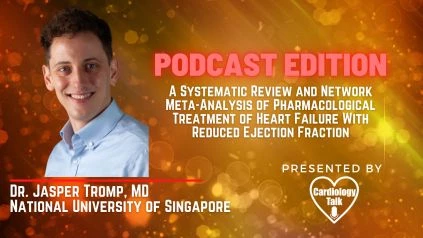Podcast- Dr. Jasper Tromp, MD- A Systematic Review and Network-Meta-Analysis of Pharmacological Treatment of Heart Fa...
Dr. Jasper Tromp works as a physician, epidemiologist, and assistant professor of public health at the National University of Singapore and Duke-NUS Medical School in the epidemiology area. In this podcast Dr. Tromp discusses a Systematic Review and Network-Meta-Analysis of Pharmacological Treatment of Heart Failure With Reduced Ejection Fraction.
https://www.jacc.org/doi/10.1016/j.jchf.2021.09.004
Abstract-
The goal of this study was to calculate and compare the total treatment benefit of pharmacological therapy for heart failure (HF) with a low ejection fraction.
Background-
The treatment effects of various combinations of modern HF medical therapy are not fully understood.
Methods-
We conducted a systematic network meta-analysis for randomized controlled trials published between January 1987 and January 2020, using MEDLINE/EMBASE and the Cochrane Central Register of Controlled Trials. Digoxin, hydralazine-isosorbide dinitrate, ivabradine, angiotensin receptor–neprilysin inhibitors (ARNi), sodium glucose cotransporter-2 inhibitors (SGLT2i), vericiguat, and omecamtiv-mecarbil were among the drugs studied. The most common outcome was death from any cause. We calculated the number of life years gained in two HF groups (BIOSTAT-CHF [BIOlogy Study to TAilored Treatment in Chronic Heart Failure] and ASIAN-HF [Asian Sudden Cardiac Death in Heart Failure Registry]).
Results-
We found 75 trials with 95,444 participants that were relevant. All-cause death was reduced the most with a combination of ARNi, BB, MRA, and SGLT2i (HR: 0.39; 95 percent CI: 0.31-0.49); followed by ARNi, BB, MRA, and vericiguat (HR: 0.41; 95 percent CI: 0.32-0.53); and ARNi, BB, and MRA (HR: 0.41; 95 percent CI: 0.32-0.53). (HR: 0.44; 95 percent CI: 0.36-0.54). The composite outcome of cardiovascular death or initial hospitalization for HF had similar results (HR: 0.36; 95 percent CI: 0.29-0.46 for ARNi, BB, MRA, and SGLT2i; HR: 0.44; 95 percent CI: 0.35-0.56 for ARNi, BB, MRA, and omecamtiv-mecarbil; and HR: 0.43; 95 percent CI: 0.34-0.55 for ARNi, BB, MRA, and vericiguat). In secondary analyses, the projected increased number of life-years gained for a 70-year-old patient on ARNi, BB, MRA, and SGLT2i compared to no treatment was 5.0 years (2.5-7.5 years).
Conclusions-
The anticipated aggregate benefit for a combination of ARNi, BB, MRA, and SGLT2i in patients with HF with reduced ejection fraction is the largest.



